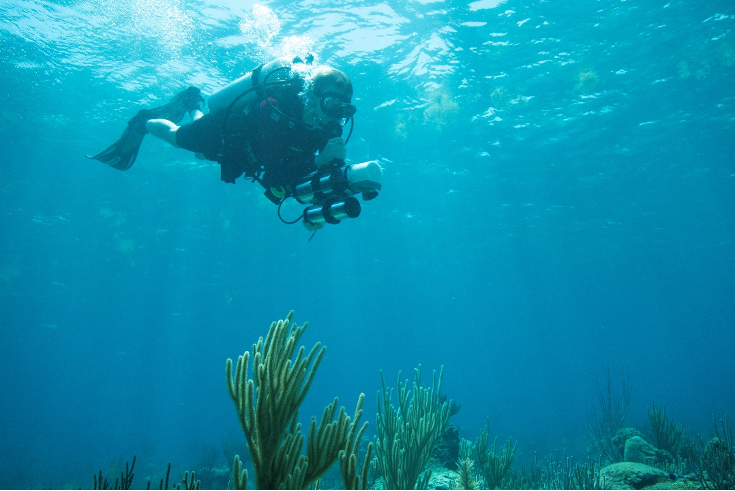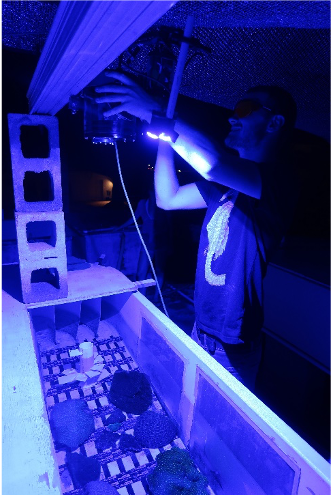Why is this project important and timely?
With climate change and other stressors impacting our seas and oceans, coral reef degradation has been brought to the forefront of the climate change issue. With global bleaching events becoming ever more prevalent, non-destructive monitoring techniques are vital.
My research involves studying the loss in colour as corals bleach, associated with the loss of symbionts namely Symbiodiniaceae and fluorescent proteins. This is achieved using a device called a Hyperspectral camera. While most everyday cameras image in three bands or colours (Red Green Blue or RGB), a Hyperspectral camera scales this up and can image in hundreds of bands across the whole spectrum of visible light. The outcome of this is a camera that can very accurately image very slight changes in the amount of light and colour. By measuring specific colours (or wavelengths) that correspond to key pigments naturally occurring in the coral, such as fluorescent pigments; green fluorescent proteins (GFP) 511nm (green) (not present in all corals but most common fluorescent colour) and chlorophyll 685nm (deep red) as well as pigments visible in reflectance (natural light), we can monitor the change in strength or intensity of these light signals to estimate how ‘bleached’ or ‘healthy’ a coral is by comparing against a baseline of a healthy coral.
What is the broader impact and implication of your work?
Due to the high-tech nature of these cameras, they are highly expensive ranging from £12,000 to £120,000, which is not an insignificant amount of money and far out of the range of most marine research and conservation organisations budgets. Part of my project is to develop a low-cost hyperspectral camera that could be deployed underwater to image and monitor corals in their natural environment. We achieved this by using a special filter and a DSLR camera making a device that is around £5,000, making the device much more accessible to a wide array of organisations and applications.
How did you come to work in this field?
From an early age I have been interested in fish and the marine world, frequently dragging my parents to aquariums much to my behest. From then on I have tried to immerse myself in marine activities and so the logical choice was to study marine science at university, to which I have done but along the way realizing biology was not my strongest suit and so a plan was devised to marry my passion of electronics and technology with my marine one. During dissertations in my degrees I have made sensors and robotics for characterizing the marine environment.
What is your top graduate school life hack or survival resource?
From the start of a course or degree I have been writing up everything and this has really helped me to be fortunate enough to publish papers and particularly in my PhD thesis enabled me to be in a good position now where I have the majority of the writing done.
So my advice is start writing what you can where you can, even if it doesn’t turn out to be usable in your dissertation/thesis/reports it will enable you to gain practice writing and could possibly lead to a paper (you never know).
Location of fieldwork; why choose this location?
I have been fortunate enough to win scholarships to be able to learn and conduct research out in Bermuda with the Bermuda Institute of marine science (BIOS). Courtesy of the UK associates of BIOS, an organsiation dedicated to helping fund marine research.
Best and worst parts of your fieldwork:
Being able to work with amazing academics and in an amazing place such as Bermuda, I consider myself extremely lucky to have been able to do so.

